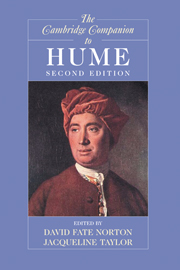Book contents
- Frontmatter
- 1 An Introduction to Hume’s Thought
- 2 Hume’s New Science of the Mind
- 3 Hume and the Mechanics of Mind: Impressions, Ideas, and Association
- 4 Hume’s Theory of Space and Time in Its Skeptical Context
- 5 Hume on Causation
- 6 Hume and the Problem of Personal Identity
- 7 Hume’s Skepticism
- 8 Hume’s Moral Psychology
- 9 The Foundations of Morality in Hume’s Treatise
- 10 Hume’s Later Moral Philosophy
- 11 The Structure of Hume’s Political Theory
- 12 Hume’s Principles of Political Economy
- 13 Hume on the Arts and “The Standard of Taste”: Texts and Contexts
- 14 David Hume: “The Historian”
- 15 Hume on Religion
- Appendix: Hume’s Autobiographies
- Selected Bibliography
- Index
- Series List
2 - Hume’s New Science of the Mind
Published online by Cambridge University Press: 28 May 2009
- Frontmatter
- 1 An Introduction to Hume’s Thought
- 2 Hume’s New Science of the Mind
- 3 Hume and the Mechanics of Mind: Impressions, Ideas, and Association
- 4 Hume’s Theory of Space and Time in Its Skeptical Context
- 5 Hume on Causation
- 6 Hume and the Problem of Personal Identity
- 7 Hume’s Skepticism
- 8 Hume’s Moral Psychology
- 9 The Foundations of Morality in Hume’s Treatise
- 10 Hume’s Later Moral Philosophy
- 11 The Structure of Hume’s Political Theory
- 12 Hume’s Principles of Political Economy
- 13 Hume on the Arts and “The Standard of Taste”: Texts and Contexts
- 14 David Hume: “The Historian”
- 15 Hume on Religion
- Appendix: Hume’s Autobiographies
- Selected Bibliography
- Index
- Series List
Summary
“Human Nature is the only science of man.”
T 1.4.7.14For Hume, understanding the workings of the mind is the key to understanding everything else. There is a sense, therefore, in which to write about Hume's philosophy of mind is to write about all of his philosophy. With that said, I shall nonetheless focus here on those specific doctrines that belong to what we today call the philosophy of mind, given our somewhat narrower conception of that subject. It should also be remembered that Hume describes his inquiry into the nature and workings of the mind as a science. This is an important clue to understanding both the goals and the results of that inquiry, as well as the methods Hume uses in pursuing it. As we will see, there is a thread running from Hume's project of founding a science of the mind to that of the so-called cognitive sciences of the late twentieth century. For both, the study of the mind is in important respects just like the study of any other natural phenomenon. While it would be an overstatement to say that Hume's entire interest lies in the construction of a science in this sense - he has other, more traditionally “philosophical,” concerns - recognizing the centrality of this scientific aim is essential for understanding him.
- Type
- Chapter
- Information
- The Cambridge Companion to Hume , pp. 40 - 69Publisher: Cambridge University PressPrint publication year: 2008
- 2
- Cited by

